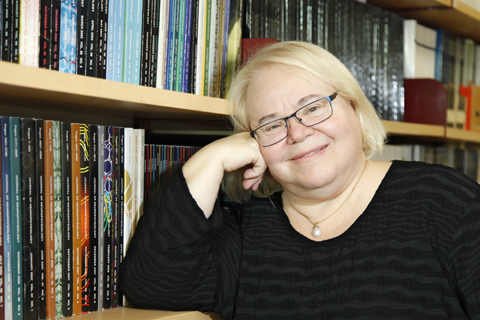Neuroscientist Eve Marder’s advice to aspiring scientists
The renowned scientist’s personal essays are a treasure trove of insights into building a successful career in academic research.
 Photo: Mike Lovett
Photo: Mike LovettSince 2012, Victor and Gwendolyn Beinfield Professor of Neuroscience Eve Marder ’69 has been writing a series of articles for the online journal eLife in which she reflects on her professional life and offers some words of wisdom to today’s young researchers.
The insights from one of the country’s preeminent biologists offer a unique perspective on the pros and cons of working in academic research
Below are highlights from Marder’s essays with links to the originals for further reading.
Spend time abroad.
Getting on a plane in one country and getting off in a place where the sounds and sights are different, and the education system is different, brings perspectives that cannot be replaced by Skype. ... I urge every beginning scientist to get on an airplane to somewhere, to live and do experiments in a different country, even if only for a short visit. Scientists are supposed to be explorers! Go somewhere. Especially somewhere unexpected.
Source: "Living Science: Crossing oceans" eLife 2013;2:e00477
Don’t underestimate the power of luck.
It is important to recognize that some of the most important events in our lives, as scientists and people, depend on luck or chance. We accept that the randomness of the world plays an important role in finding a spouse, significant other and friends. I met my husband on a hot August day when we were both outside the student center at Brandeis University. My newspaper blew away and he rescued it. Perhaps had that not been a windy day, or perhaps if he had been there 10 minutes later, we might never have talked. Calling this luck does not devalue its importance, or the significance he has in my life.
Source: "Living Science: Luck, jobs and learning" eLife 2013;2:e00676
Don’t overhype your research.
The most common complaint from [eLife] reviewers is that authors are overselling their work. We understand that competition for funding and pages in prestige journals has taught authors to frame their work in the most globally ambitious terms. However, there is a fine line between trying to express in a crisp and compelling manner a manuscript’s contribution, and making claims that are beyond what the manuscript does or could do.
Source: "Peer Review: The pleasure of publishing" with
Graduate school application decisions are often arbitrary.
What hasn’t changed is my aggravation with colleagues who believe that we are making rational decisions about who is likely to become an outstanding scientist: The truth is that we are making facile decisions with no more reliability than if we were consulting a crystal ball.
Source: "Living Science: The rites of spring, Take 2" eLife 2016;5:e16846
Don’t get hung up on fame and prestige.
A good job is one that gives you the intellectual space to develop as an independent scientist, and this might be anywhere in the world, on any of the seven continents. There are numerous scientists of international repute who spent their formative years at less-well known institutions. Many of them will tell you that their careers benefited from the freedom to make their own mistakes in peace, away from the limelight.
Source: "Living Science: A good life" eLife 2012;1:e00353
Science offers the good life.
Yes, doing science can demand long hours, and there are periods when the rewards seem illusive
and elusive. But, it can also be a good life, filled with intellectual vitality and community. For those of you who feel the call of the unknown, and who want to see a small piece of life’s mysteries for the first time in human experience, science is a wonderful path through still unknown forests and mountains, although like most hiking trails, the path will dip into mire and fog along the way.
Source: "Living Science: A good life" eLife 2012;1:e00353
What you store in your head matters more than what you store on your phone.
My students’ failure to remember drives me to distraction. Although I rarely pull rank and give my students orders, I have started telling them that they are not allowed to forget what they studied last year or read last week. Of course I know that they can always use their devices to access the cloud for answers to their queries. ... I just cannot get my head around the fact that some students don’t remember their own data.
But the real reason I care so much about the scientist’s brain being an important storage device for experiments completed, papers read and courses studied is that it is impossible to think creatively into the future without a sense of what is known. We commonly say that we are looking for interdisciplinary and synthetic thinkers who can make connections between disparate fields, and see new paths for discovery. I cannot imagine finding those creative future leaders among the legions of students who forget everything they have learned because they can “just look it up.”
Source: "The importance of remembering" eLife. 2017;6 e30599.
The past has a lot to teach us.
I feel like a grandmother elephant trying to warn the young that some of the water holes they are moving toward may be mirages or surrounded by quicksand. Part of me thinks that many of those rushing to use new technologies in an effort to understand various circuits within the brain would benefit from knowing more about the hard-fought insights contained in the older literature, and also more about some of the mistakes that were made in the past. ... The early pharmacologists, physiologists and biophysicists were able to extract deep insights into biological processes with simple experiments and clear thinking.
Source: "Living Science: Grandmother elephants" eLife 2013;2:e01140
All articles published under the Creative Commons license.
Compiled by Lawrence Goodman.
Categories: Research, Science and Technology





